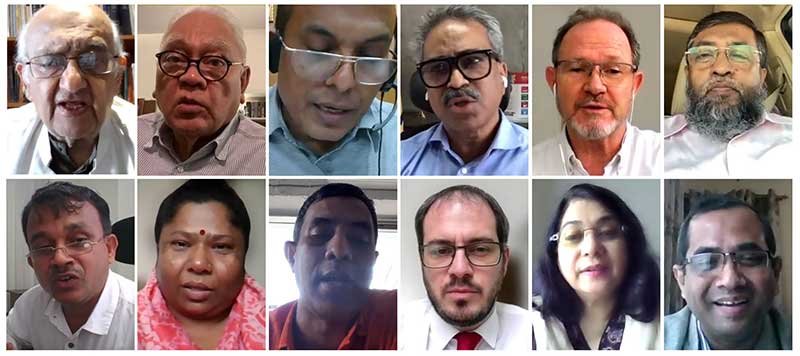The success of industrial safety in the RMG sector needs to be maintained in the post-Accord-Alliance period. This is urged by the stakeholders participated in the CPD-FES Virtual Dialogue. Industrial safety in the RMG sector has been passing a critical stage with lack of proper coordination and proper monitoring and enforcement which are likely to be the reasons behind rising industrial accidents. The rising accidents in the RMG sector observed in earlier inspected factories as well as not registered factories. Reasons for accidents has been spread from fire related issues to electrical, fire, short circuit and structural issues. The accidents are observed mainly in medium and large-scale factories. Weak maintenance of safety standards and lack of regular monitoring would be the reasons behind industrial accidents in the RMG factories. Boiler related and gas related explosions are other reasons which are also becoming important.
A major focus of the post-Accord-Alliance period should be complete the institutionalisation process of industrial safety in the RMG sector and give it a shape of sustainability. A two-pronged approach will be needed in order to address these challenges. First, strengthening the monitoring and enforcement capacity of existing organisations with maintaining transparency and accountability. Second, overall coordination of industrial safety to be set under ‘one umbrella’.
These observations emerged at the CPD-FES Virtual Dialogue on Industrial Safety of the RMG Sector during the Post-Accord-Alliance Period. The dialogue was held on 11 July 2021 and organised by the Centre for Policy Dialogue (CPD) and Friedrich-Ebert-Stiftung (FES) Bangladesh.

Dr Fahmida Khatun, Executive Director, CPD and Mr Felix Kolbitz, Resident Representative, FES Bangladesh Office delivered the introductory remarks at the dialogue. The CPD-FES study identifies the weaknesses and challenges of RMG Coordination Cell (RCC), RMG Sustainability Council (RSC) and Department of Inspection for Factories and Establishments (DIFE) in the process of institutionalising the safety process in the RMG enterprises; and based on those analyses, it put forward a set of suggestions with a view to improving the institutional capacity to maintain the industrial safety on a sustained basis.
In his keynote presentation, CPD’s Research Director, Dr Khondaker Golam Moazzem stated that it is well known that the industrial safety of export-oriented RMG enterprises has made significant improvement through various initiatives undertaken under the National Tripartite Plan of Action (NTPA) during 2013-2018. These activities had been carried out under the Accord, the Alliance and the National Initiatives. With the successful implementation of those initiatives during 2013–2018, it was expected that a process of institutionalisation of industrial safety in the RMG sector would be completed. After three years (2018-2021) it has been realised by the stakeholders that the process of institutionalisation on industrial safety needs further activities in order to make it fully operational. After 2018, a number of organisational set up had been formed for industrial safety in RMG enterprises and a few are currently at different levels of implementation including those of RCC, RMG Sustainability Council RSC and the proposed Industrial Safety Unit (ISU). In this backdrop, the study examined the institutional capacity of RCC, RSC, Nirapon and other public entities to monitor fire, electrical and building structures of RMG enterprises by ensuring their effectiveness, transparency and accountability.
Mr Md. Nasir Uddin Ahmed, Inspector General, DIFE, Ministry of Labour and Employment, Government of Bangladesh was a Guest of Honour at the dialogue. He stated that currently the COVID inspection is more emphasised but the general inspection must be carried out in full flow as well. He put emphasis on more human resource in the DIFE in order to undertake safety inspection and monitoring properly. Speaking as another Guest of Honour, Mr Faruque Hassan, President, Bangladesh Garment Manufacturers and Exporters Association (BGMEA) and Managing Director, Giant Group stated that there has been immense improvement in ensuring factory safety in the RMG sector. BGMEA will work with all stakeholders for further improvement of industrial safety. Mr Mohammad Hatem, First Vice-President, Bangladesh Knitwear Manufacturers and Exporters Association (BKMEA) also opined that RMG factories of Bangladesh are a role-model for ensuring safety. RSC needs to work in close cooperation with all stakeholders. Mr George Faller, Office In-Charge, ILO Country Office stated that DIFE is an inspecting body, a holistic approach is required to ensure enforcement of safety guidelines.
A Distinguished Panelist at the dialogue, Mr Abul Khair Mohammad Salehuddin, Project Director (Deputy Secretary), RCC, DIFE, Ministry of Labour and Employment, Government of Bangladesh stated that RSC is a private initiative and it can increase collaboration with DIFE and RCC. Ms Kalpona Akter, Executive Director, Bangladesh Center for Workers Solidarity (BCWS) called for buyer obligation in ensuring factory safety. Another Panelist, Mr Md Babul Akhter, Former Secretary General, IndustriAll Bangladesh Council and President, Bangladesh Garments & Industrial Workers Federation stated that the recent incidents show that factory safety is a concern beyond the RMG sector. DIFE and DoL need to work transparently and efficiently.
CPD’s Chairman, Professor Rehman Sobhan shared his opinion on how RMG factories have improved significantly but the safety issue is a concern for all industries. Commenting on the poor regulatory and oversight mechanism, Professor Sobhan recommended the government to look after all industries. He also shed light on the role of trade unions in ensuring safety rights of the labours who are at the centre point of this issue. CSOs could play an important role as pressure group in the monitoring process.
The session was chaired by Mr Syed Manzur Elahi, Member, CPD Board of Trustees, Former Advisor to the Caretaker Government and Chairman, Apex Group. In the closing remarks, he ended on a positive note by calling for an optimistic attitude by the involved stakeholders to deal with the problems collectively.
The dialogue was also participated by relevant government officials, business leaders, development activists, experts and academia, representatives from the development partners and media professionals.


